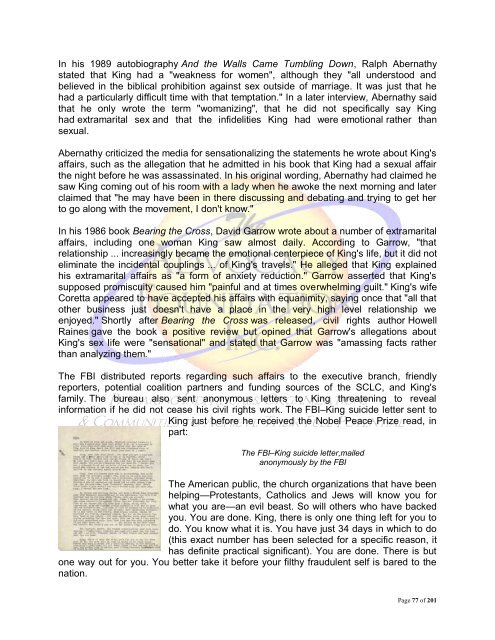You also want an ePaper? Increase the reach of your titles
YUMPU automatically turns print PDFs into web optimized ePapers that Google loves.
In his 1989 autobiography And the Walls Came Tumbling Down, Ralph Abernathy<br />
stated that King had a "weakness for women", although they "all understood and<br />
believed in the biblical prohibition against sex outside <strong>of</strong> marriage. It was just that he<br />
had a particularly difficult time with that temptation." In a later interview, Abernathy said<br />
that he only wrote the term "womanizing", that he did not specifically say King<br />
had extramarital sex and that the infidelities King had were emotional rather than<br />
sexual.<br />
Abernathy criticized the media for sensationalizing the statements he wrote about King's<br />
affairs, such as the allegation that he admitted in his book that King had a sexual affair<br />
the night before he was assassinated. In his original wording, Abernathy had claimed he<br />
saw King coming out <strong>of</strong> his room with a lady when he awoke the next morning and later<br />
claimed that "he may have been in there discussing and debating and trying to get her<br />
to go along with the movement, I don't know."<br />
In his 1986 book Bearing the Cross, David Garrow wrote about a number <strong>of</strong> extramarital<br />
affairs, including one woman King saw almost daily. According to Garrow, "that<br />
relationship ... increasingly became the emotional centerpiece <strong>of</strong> King's life, but it did not<br />
eliminate the incidental couplings ... <strong>of</strong> King's travels." He alleged that King explained<br />
his extramarital affairs as "a form <strong>of</strong> anxiety reduction." Garrow asserted that King's<br />
supposed promiscuity caused him "painful and at times overwhelming guilt." King's wife<br />
Coretta appeared to have accepted his affairs with equanimity, saying once that "all that<br />
other business just doesn't have a place in the very high level relationship we<br />
enjoyed." Shortly after Bearing the Cross was released, civil rights author Howell<br />
Raines gave the book a positive review but opined that Garrow's allegations about<br />
King's sex life were "sensational" and stated that Garrow was "amassing facts rather<br />
than analyzing them."<br />
<strong>The</strong> FBI distributed reports regarding such affairs to the executive branch, friendly<br />
reporters, potential coalition partners and funding sources <strong>of</strong> the SCLC, and King's<br />
family. <strong>The</strong> bureau also sent anonymous letters to King threatening to reveal<br />
information if he did not cease his civil rights work. <strong>The</strong> FBI–King suicide letter sent to<br />
King just before he received the Nobel Peace Prize read, in<br />
part:<br />
<strong>The</strong> FBI–King suicide letter,mailed<br />
anonymously by the FBI<br />
<strong>The</strong> American public, the church organizations that have been<br />
helping—Protestants, Catholics and Jews will know you for<br />
what you are—an evil beast. So will others who have backed<br />
you. You are done. King, there is only one thing left for you to<br />
do. You know what it is. You have just 34 days in which to do<br />
(this exact number has been selected for a specific reason, it<br />
has definite practical significant). You are done. <strong>The</strong>re is but<br />
one way out for you. You better take it before your filthy fraudulent self is bared to the<br />
nation.<br />
Page 77 <strong>of</strong> 201

















